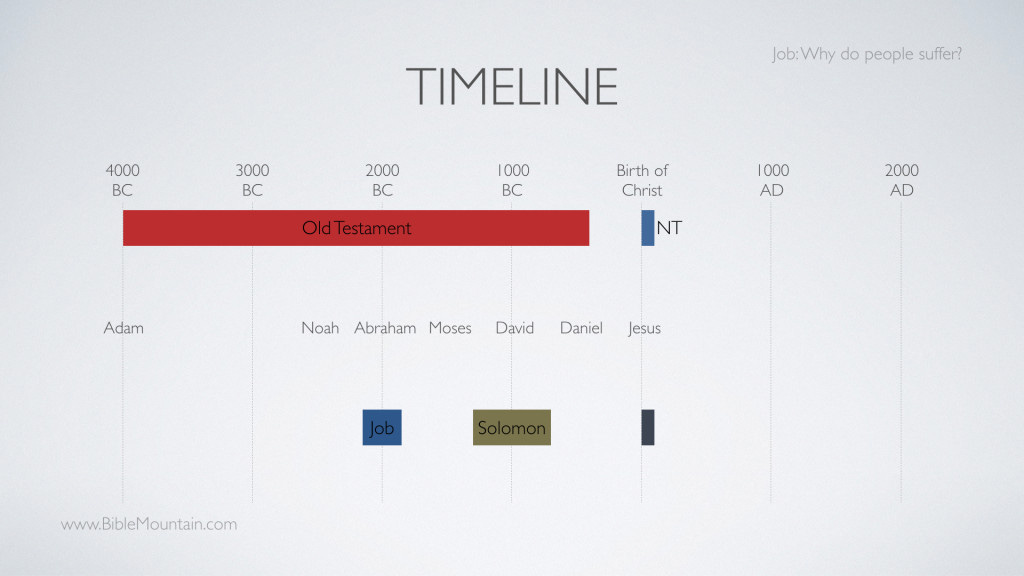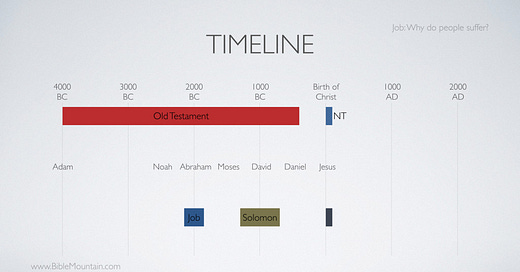Why do the wicked prosper?
Today we’re going to answer the question: Why do the wicked prosper? Our passage is Job 18. This question is important because all of us want life to be fair, and when we see the wicked prosper, we know that isn’t fair, so we want to know why they prosper because we need to know how to deal with the unfairness.
https://youtu.be/OASt8hIyzlI
Historical Context.
This timeline stretches from creation around 4000 BC to our day around 2000 AD. The Old Testament covers the time period from 4000 BC to 400 BC. The New Testament covers the first century AD. Our passage is from the book of Job, which tells us about the life of Job. Job probably lived around 2000 BC. We’re also going to look at some verses written by Solomon around 1000 BC and some verses from the New Testament written in the first century AD.

Most of the Bible tells us a story about the nation of Israel. The story of the Bible starts around 4000 BC with creation and Adam and Eve. Man multiplied and became very sinful, so around 2500 BC God destroyed all mankind except for Noah and his family. Man started to multiply again and a man named Abraham was born around 2000 BC. The nation of Israel descended from Abraham. Abraham’s descendants ended up in Egypt as slaves and then Moses delivered them from slavery around 1500 BC. After existing as separate tribes for several centuries, the tribes of Israel became one kingdom and a man named David became king around 1000 BC. David’s son Solomon became king after David. Solomon was very wise, and we’re going to look at some of his wisdom writings as we answer our question about why the wicked prosper. Towards the end of the Old Testament time period there was a man named Daniel, and then in the first century AD we have the New Testament time period which is when God came to earth as a man named Jesus. After the death, burial, and resurrection of Jesus, the apostles wrote the New Testament, including some verses we are going to look at as we answer our question about why the wicked prosper.
Job's Story
The book of Job is a little unique. Most of the Bible tells the story of the nation of Israel. Job was not part of that story. The book of Job sort of stands alone as its own separate story.
At the beginning of the book of Job, Job was healthy, wealthy, and wise. Then there was a dialogue in heaven between Yahweh and Satan, and Satan was given permission to take away Job’s children, possessions, and health. Next, three friends came to visit Job and the bulk of the book of Job is a dialogue that took place between Job and his friends. Job spoke first, then Eliphaz, then Job, then Bildad, then Job, then Zophar, then Job again, and this pattern kept repeating.Near the end a man named Elihu spoke, and then at the very end Yahweh spoke and He restored Job’s health, wealth, and family. During this dialogue between Job and his friends, the friends tried to convince Job he had lost everything because of sin. Keep in mind, Job and his friends did not know Satan had been given permission to harm Job; thus, they didn’t know the true reason for Job’s loss. The friends used a variety of arguments to try and convince Job he must have sinned. Today we’re going to look at Job 18 in which Bildad tried to convince Job the wicked never prosper, and since Job was not prospering, then Job must have sinned. Later, I'll discuss whether or not Bildad was correct.
Synonymous Parallelism
In order to understand Job 18 it helps to understand a little about Hebrew poetry, specifically synonymous parallelism. Unlike English poetry which is all about rhyme, Hebrew poetry is about repetition and contrast. In synonymous parallelism the poet keeps repeating the same idea over and over again in different ways. Job 18 is mostly synonymous parallelism, meaning Bildad kept repeating his belief that the wicked do not prosper. After starting off by launching some insults at Job, Bildad stated his theme for the first time in verse 5.
Job 18:5 “Indeed, the light of the wicked goes out,
And the flame of his fire gives no light.
Both of these lines essentially say the same thing. As you read Job 18, notice how Bildad kept repeating this same theme over and over again.
Job 18
Job 18:1 Then Bildad the Shuhite responded,
Job 18:2 “How long will you[Job] hunt for words?
Show understanding and then we can talk.
Job 18:3 “Why are we[Eliphaz, Bildad, Zophar] regarded as beasts,
As stupid in your[Job’s] eyes?
Job 18:4 “O you[Job] who tear yourself in your anger —
For your sake is the earth to be abandoned,
Or the rock to be moved from its place?
Job 18:5 “Indeed, the light of the wicked goes out,
And the flame of his fire gives no light.
Job 18:6 “The light in his[the wicked’s] tent is darkened,
And his lamp goes out above him.
Job 18:7 “His[the wicked’s] vigorous stride is shortened,
And his own scheme brings him down.
Job 18:8 “For he[the wicked] is thrown into the net by his own feet,
And he steps on the webbing.
Job 18:9 “A snare seizes him[the wicked] by the heel,
And a trap snaps shut on him.
Job 18:10 “A noose for him[the wicked] is hidden in the ground,
And a trap for him on the path.
Job 18:11 “All around terrors frighten him[the wicked],
And harry him at every step.
Job 18:12 “His[the wicked’s] strength is famished,
And calamity is ready at his side.
Job 18:13 “His[the wicked’s] skin is devoured by disease,
The firstborn of death devours his limbs.
Job 18:14 “He[the wicked] is torn from the security of his tent,
And they march him before the king of terrors.
Job 18:15 “There dwells in his[the wicked’s] tent nothing of his;
Brimstone is scattered on his habitation.
Job 18:16 “His[the wicked’s] roots are dried below,
And his branch is cut off above.
Job 18:17 “Memory of him[the wicked] perishes from the earth,
And he has no name abroad.
Job 18:18 “He[the wicked] is driven from light into darkness,
And chased from the inhabited world.
Job 18:19 “He has no offspring or posterity among his people,
Nor any survivor where he sojourned.
Job 18:20 “Those in the west are appalled at his[the wicked’s] fate,
And those in the east are seized with horror.
Job 18:21 “Surely such are the dwellings of the wicked,
And this is the place of him who does not know God.”
Is it true the wicked never prosper?
Look at that last verse again:
Job 18:21 “Surely such are the dwellings of the wicked,
And this is the place of him who does not know God.”
The word “such” and the word “this” referred to everything Bildad had just said about the wicked: they have no offspring, there is no memory of them, they are not secure, and they do not prosper. Notice the last line: “this is the place of him who does not know God.” Bildad and his friends were trying to convince Job he had lost everything because he had sinned. In Job 18 Bildad was arguing the wicked never prosper. The conclusion about Job was that since Job was not prospering, then Job must have sinned. Was Bildad correct? Is it true that the wicked never prosper? Before I answer those questions, let me make a few comments about inspiration and inerrancy.
Inspiration and Inerrancy
Inspiration and inerrancy apply to the author of the book of Job. Bildad was not the author of Job. Inspiration and inerrancy mean the author of Job accurately recorded what Bildad said. If Bildad said something wrong, then inspiration and inerrancy mean the author of Job accurately recorded Bildad’s error.
Do the wicked ever prosper?
Let’s look at two passages that were written around 1000 BC by Solomon.
Eccl. 7:15 I[Solomon] have seen everything during my lifetime of futility; there is a righteous man who perishes in his righteousness and there is a wicked man who prolongs his life in his wickedness.
Eccl. 8:14 There is futility which is done on the earth, that is, there are righteous men to whom it happens according to the deeds of the wicked. On the other hand, there are evil men to whom it happens according to the deeds of the righteous. I say that this too is futility.
Solomon was the wisest man who ever lived and he wrote that sometimes the wicked do prosper, in fact, Solomon had observed this truth with his very own eyes. In this case biblical inspiration and inerrancy do mean Solomon was correct, because inspiration and inerrancy apply to the author of the book of Ecclesiastes, and Solomon was the author, so he was inspired when he wrote that sometimes the wicked prosper.
God and Time
Why do the wicked prosper? Why doesn’t God do something? Let's look at two passages that were written in the first century AD.
2Pet. 3:8 But do not let this one fact escape your notice, beloved, that with the Lord one day is like a thousand years, and a thousand years like one day.
2Pet. 3:9 The Lord is not slow about His promise, as some count slowness, but is patient toward you, not wishing for any to perish but for all to come to repentance.
2Pet. 3:10 But the day of the Lord will come like a thief, in which the heavens will pass away with a roar and the elements will be destroyed with intense heat, and the earth and its works will be burned up.
Notice this phrase, “with the Lord one day is like a thousand years”. If a child does something wrong and his parents need to correct him, depending on the circumstances, the parents may wait a day or so till they address the incident. If we humans wait a day or so to address wrongdoing, and if one day is like a thousand years to the Lord, then is it possible the Lord might wait years to deal with wrongdoing? In other words, it may look to us like the wicked are prospering and getting away with wickedness, but perhaps in the long run they will not get away with their wickedness.
Let’s look at 2Cor. 5:10.
2Cor. 5:10 For we must all appear before the judgment seat of Christ, so that each one may be recompensed for his deeds in the body, according to what he has done, whether good or bad.
This is a clear statement that eventually every person, including every wicked person, will give an account of themselves to God. Notice also everyone will be recompensed for their deeds. This tells us eventually the wicked will get what they deserve.
Why do the wicked prosper?
The answer is God does things His way on His timetable. Here on earth the wicked may prosper; Solomon stated this in Ecclesiastes. However, eventually everyone will stand before God, and everyone will be recompensed for their deeds. And so a wicked person who appears to be prospering and getting away with wickedness here on earth will have to stand before God someday and answer for his wickedness. So while the wicked may prosper for a while, in the long run the wicked will not prosper; ultimately, the wicked will not get away with their wickedness. So when we are agitated by wickedness and the unfairness of life, we need to remember that God does things His way on His timetable, and eventually God will deal with the wickedness.
“Scripture quotations taken from the NASB."
Would you like to be notified when new posts are published?
[widgets_on_pages id="Follow"]


